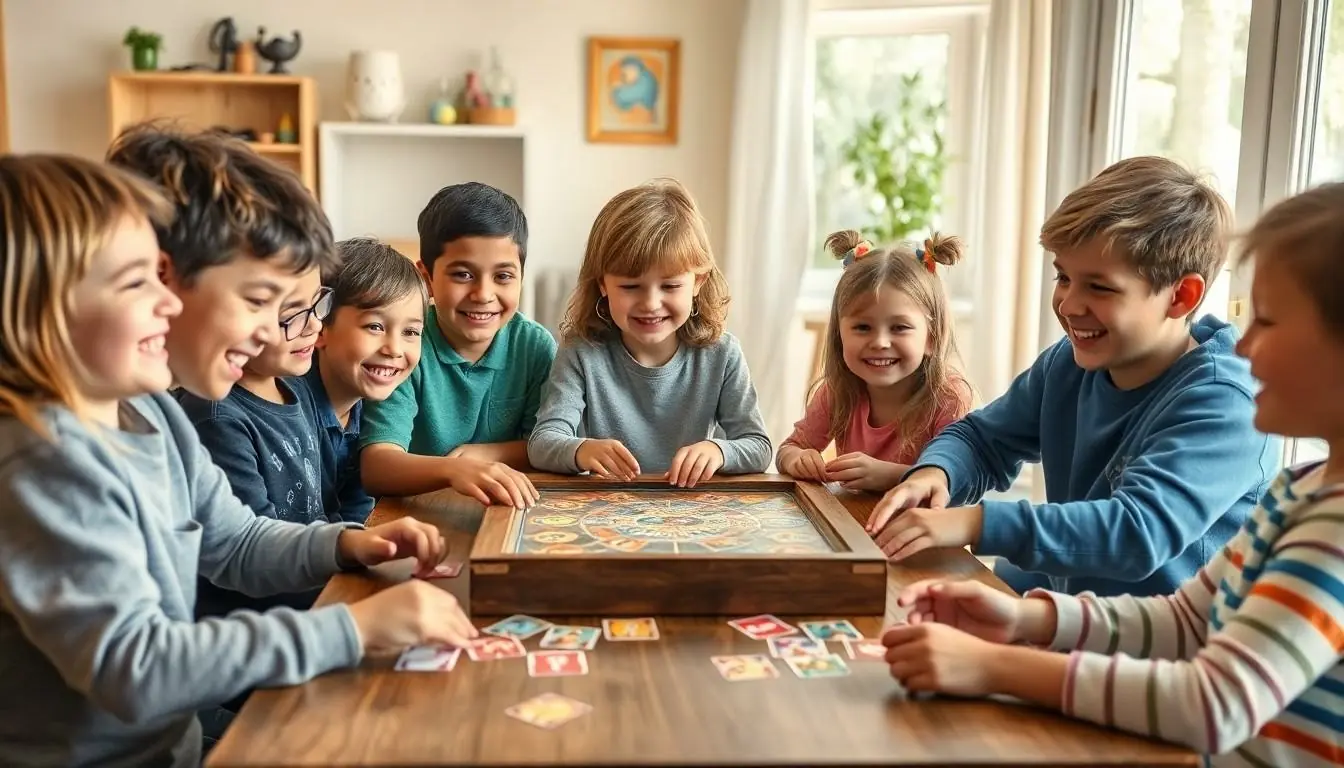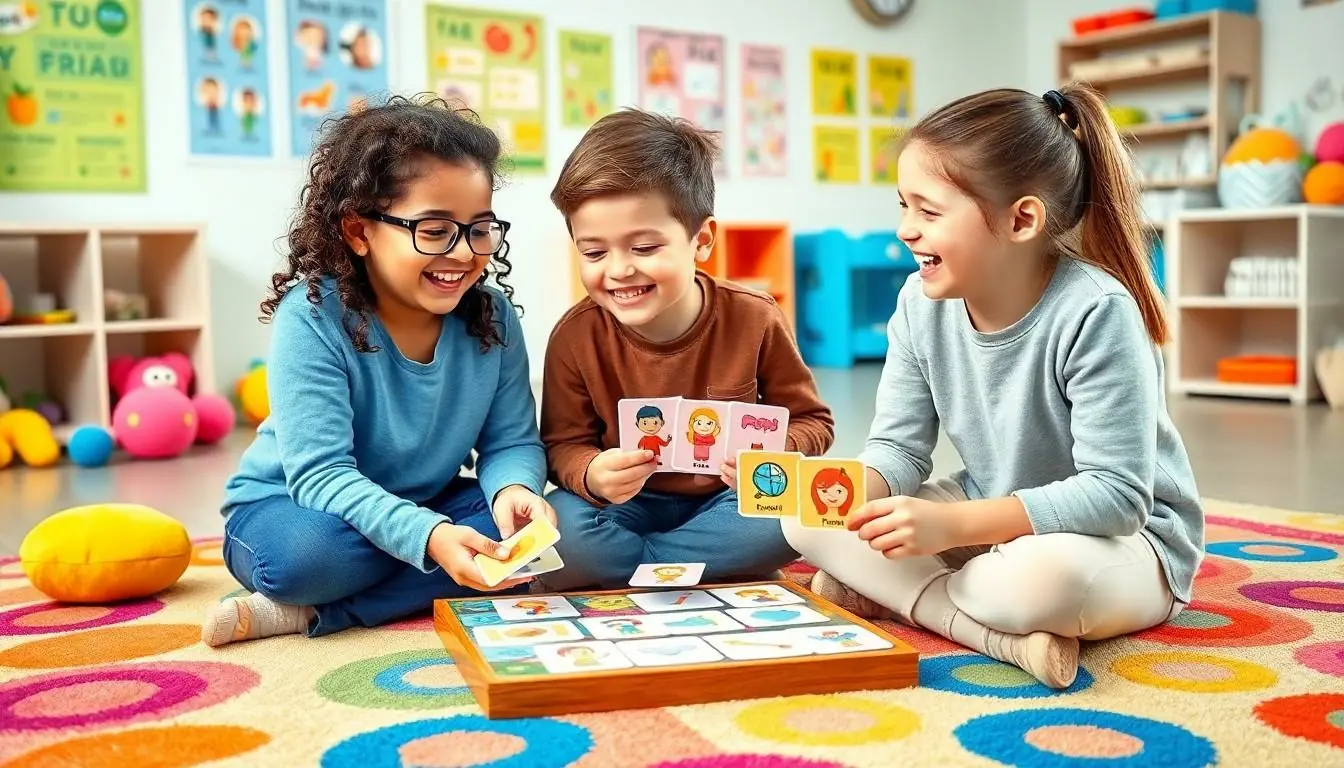In a world where kids are glued to screens and video games, why not turn that screen time into a mental health boost? Mental health games for kids are not just fun; they’re a secret weapon for building resilience, coping skills, and emotional intelligence. Imagine a game where your child can defeat anxiety monsters or embark on a quest to find their inner calm. Sounds like a win-win, right?
Table of Contents
ToggleOverview of Mental Health Games for Kids
Mental health games for kids focus on emotional development and coping strategies. These games serve as interactive tools that create a safe environment for children to explore their feelings. Engaging activities encourage positive coping mechanisms, helping kids manage anxiety and stress effectively.
Many games integrate storytelling and scenario-based challenges. Children can navigate various situations, learning to articulate their emotions and practice problem-solving. Options like board games and digital apps foster interaction among peers, enhancing social skills while promoting mental well-being.
Research supports the use of games to improve emotional intelligence. Evidence shows kids who participate in these activities often develop better self-regulation and resilience. Games that incorporate mindfulness practices can also teach breathing techniques and emotional awareness.
Elements of teamwork and collaboration feature prominently in many mental health games. Kids learn to communicate effectively, share experiences, and build trust with others. Group activities like role-playing further enhance empathy, encouraging children to consider perspectives beyond their own.
In terms of accessibility, a variety of resources cater to different age groups and preferences. Apps that focus on anxiety relief are available for older kids, while younger children benefit from simple board games. Engaging formats like card games or interactive storytelling can attract a wide audience, drawing in children who may not engage in traditional therapy.
Overall, mental health games represent an innovative approach to promoting psychological well-being. By prioritizing emotional growth and resilience, these games contribute to a holistic understanding of mental health for kids.
Benefits of Mental Health Games

Mental health games offer numerous advantages for children’s psychological well-being, contributing positively to their overall development.
Emotional Regulation
Emotional regulation emerges as a key benefit of mental health games. Through engaging gameplay, children encounter scenarios that require expression and management of emotions. They learn to identify feelings like anger, sadness, and anxiety, enhancing their ability to articulate these emotions effectively. Games often include elements that encourage reflection, enabling kids to explore different coping mechanisms while navigating challenges. By embracing these interactive experiences, children develop resilience and self-control. They also gain insights into problem-solving, which can prove beneficial in real-life situations. Research highlights that improved emotional regulation leads to better outcomes in academics and peer interactions.
Social Skills Development
Social skills development forms another essential benefit of mental health games. These games often demand teamwork, fostering collaboration among participants. Kids practice effective communication and conflict resolution as they engage with peers. Structures within the games encourage understanding and empathy, allowing children to appreciate diverse perspectives. Furthermore, positive interactions with others reduce feelings of isolation and anxiety. Participation in these games also builds confidence, enabling kids to initiate friendships. Various game formats, whether digital or board-based, support interaction and learning, setting a foundation for healthy social connections throughout their lives.
Types of Mental Health Games for Kids
Various types of mental health games enrich children’s emotional and social skills. These games offer dynamic ways to enhance well-being through engaging play.
Board Games
Board games provide a tactile experience while fostering social interaction. Games like “The Anxiety Game” help children face anxiety in a structured way. Players identify feelings while navigating challenges, promoting emotional understanding. Collaborative games encourage teamwork, allowing kids to practice communication and problem-solving. Families can bond over these games, creating a safe space for discussing feelings and experiences. Such interactions strengthen emotional connections and enhance social skills.
Digital Games
Digital games introduce children to interactive scenarios that build coping skills. Apps like “Mindful Powers” encourage mindfulness and teach relaxation techniques through gameplay. Players navigate challenges designed to address feelings like stress and anxiety. Engaging storylines and characters assist in emotional articulation while children learn through relatable experiences. Multiplayer options promote cooperation, allowing kids to work together towards common goals. Useful resources include mindfulness games that can be used individually or in group settings.
Outdoor Activities
Outdoor activities promote physical health while enhancing mental well-being. Team sports foster collaboration, helping kids develop trust and teamwork. Games like “Feelings Tag” involve identifying emotions during play, supporting emotional literacy. Nature walks create opportunities for mindfulness as children connect with their surroundings. Engaging in role-playing games outdoors allows kids to express emotions spontaneously. These experiences encourage social interaction while allowing children to build resilience in various contexts.
How to Choose the Right Game
Choosing a mental health game for children involves careful consideration of several factors that meet their needs. Age appropriateness and specific mental health goals are crucial in this process.
Age Appropriateness
Select age-appropriate games to ensure they engage and resonate with children. Games designed for younger children typically feature simple mechanics and colorful designs. In contrast, older kids might benefit from more complex gameplay that encourages critical thinking. Pay attention to the game’s recommended age range, as this often indicates the level of emotional and cognitive understanding required to play effectively. Consider children’s developmental stages since they’d engage differently with a game depending on their age and emotional maturity. For instance, a board game like “The Anxiety Game” suits tweens, while an app like “Mindful Powers” effectively targets adolescents.
Specific Mental Health Goals
Identify specific mental health goals when selecting games. Focus on emotional regulation, social skills, or coping techniques based on the child’s needs. For instance, if a child struggles with anxiety, look for games that incorporate mindfulness strategies or relaxation techniques. Games that foster teamwork and communication can enhance social skills while promoting resilience. Explore titles that encourage problem-solving and emotional articulation, as they provide children with practical tools to handle challenging situations. Evaluating the focus of each game ensures it aligns with desired outcomes, ultimately supporting the child’s mental well-being.
Mental health games for kids offer a unique and engaging way to support emotional and social development. By turning gameplay into a tool for learning resilience and coping strategies, these games foster a safe space for children to explore their feelings.
With a variety of options available, from board games to digital experiences, caregivers can easily find resources that align with their child’s needs. The emphasis on teamwork and communication further enriches children’s social skills while reducing feelings of isolation.
By integrating these mental health games into daily routines, parents and educators can help nurture a generation that values emotional intelligence and mental well-being. This innovative approach lays a strong foundation for healthier emotional lives in the future.



